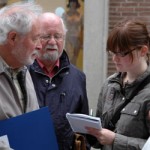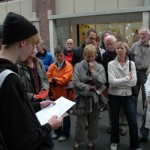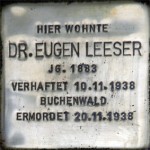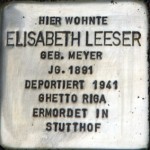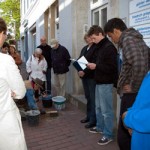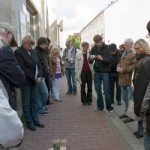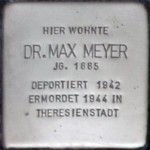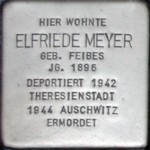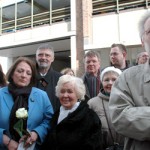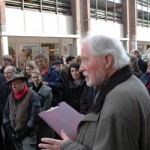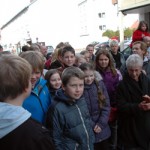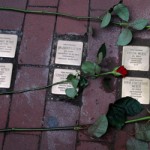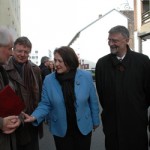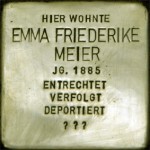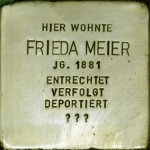The Leeser Family, The Meyer Family, The sisters Emma Friederike and Frieda Meier, and Frieda Meier
The Leeser Family
In 1938 the offices of the Jewish lawyer, Dr. Eugene Leaser, were situated at Kampstrasse 27. He also resided there, with his family.
Eugene Leaser was born in Duelmen in the district of Coesfeld on 17th March, 1883. He studied law in Munich, Berlin and Muenster and on 27th August, 1906, took up his judicial duties and was trained at several Westfalian Law Courts. On the 23rd December, 1912, he became a registered Lawyer and practiced, first of all in Hagen, then, from the 12th March, 1919, in Minden. One year later he was appointed Notary.
From 1st October, 1906 until 30th September, 1907, he completed his military duty with the King’s Bavarian Field Artillery Regiment in Fuerth, and left with the rank of Non Commissioned Officer. During the First World War he fought on several battlefields in France. In 1919 he was awarded the Iron Cross class 2 and the Bavarian Military Commendation Cross.
After his demobilisation he came to Minden where he worked as a Solicitor and Notary. He was active in the Minden Jewish Community, in which he was Vice Chairman of the Central Society of German Citizen’s of Jewish belief. On 14th November, 1891, he married Elizabeth Meyer, also Jewish, who had been born in Muenster. The pair had two sons the oldest of which, Hans, was born 11th September, 1925 and Gerhard, who was born 3rd November, 1926.
Eugene Leaser, like all Solicitors, had to swear allegiance to Adolph Hitler in 1934. It was based on the law ‘Swearing in of Civil Servants and Soldiers’ which was passed on 20th August, 1934, following the death of the Reich’s President Hindenburg. His practice suffered under the anti-Jewish boycott measures and on the 14th November, 1935, his post of Notary was withdrawn. In 1938 he was forced from his occupation as a solicitor and was only allowed to practice as a ‘Jewish Rights Consultant’ and could only represent Jewish complainants.
Dr. Gerhard Caspari, also a Jewish solicitor, worked with Eugene Leaser in his solicitor’s office and was forbidden to practice law as early as May, 1933. He left Germany early enough, emigrated to Brasil and lived in Sao Paolo after the war.
Like many other Jews Eugene Leaser was arrested by the Gestapo after the Pogrom night of 10th November, 1938. He was taken firstly to Bielefeld and from there to the concentration camp Buchenwald. He died a few days later on 20th November, 1938, in un-explained circumstances. The official cause of death was cited as a ‘Stroke’ and his body was cremated. This was normal procedure to thwart investigations by families. The Urn was buried at the Jewish Cemetery in Minden.
On 1st December, 1938, Dr. Eugen Leese was belatedly removed from the Solicitor’s Register.
His widow, Elisabeth Leeser carried on living in her own apartment. Their two sons were able to leave Germany as thirteen and fourteen year olds on transport evacuating children and were taken to England where they survived the Nazi regime. Records give no clear explanation as to Elisabeth Leeser’s fate. Certain is that she was arrested by the Gestapo and was taken, through Bielefeld, to the Riga Ghetto and from there was deported to the concentration camp Stutthof. It is not certain whether or not her displacement, from Minden, took place on 13th December, 1941, or summer 1943.
Meta Beau, nee´ Samuel, a Minden Jew, who was able to return to Minden after the War stated, on oath, that she had seen and spoken to Elizabeth Leeser in Stuttofuf. She saw how, one day, she was assigned to an extermination transport but never returned. On 8th May, 1945, Elisabeth Leeser was officially declared dead.
After Elisabeth Leeser’s displacement the household goods of the family were confiscated. During the compensation procedure that the sons began, after the war, it was discovered that the very valuable belongings of the family had been auctioned off, well under value, for the sum of 381,-Reichsmark by the Minden municipality and this sum was passed to the Head Finance Office in Muenster. It was no longer possible to discover who had received the household items. The sons received, as heirs, the sum of 2.000,- DM in damages.
The Meyer Family
Dr. Max Meyer and his wife, Elfriede, lived at Kampstrasse 27 until their deportation. It was the last accommodation of their own choosing.
Max Meyer was born to Jewish parents, in Muenster, on 1st June, 1885. In 1904 he passed his State exams there at the Grammar School.
It is thought that, at this time, he converted to Protestant beliefs. He studied law in Freiburg, Munich, Berlin and Muenster from 1904. He finished his studies and passed his first State examination in 1907, obtaining his degree as Doctor of Law in 1910, and completing his training at several Westfalian Law Courts until he obtained his registration as a Solicitor in 1929 and then as Notary, in 1925.
Between the years 1907 and 1908 he served in the military with the 1st Bavarian Infantry Regiment, in Munich. He was awarded the Iron Cross 1st and 2nd class while serving as an Officer and Company Commander in the First World War.
In 1919 Max Meyer married Elfriede nee´ Febes who was born 3rd February, 1896, who was and remained, Jewish. She looked after young children during the war, after passing her State Exams at the Protestant Girls School of Higher Education in Muenster. In the winter term of 1918/1919 she began to study Medicine but stopped after three years because of her marriage. Elfriede Meyer had suffered, since the nineteen twenties, from a chronic illness of the nervous system which became progressively worse, until she was nearly blind.
Consequently she had, for a long period of time, to be nursed permanently.
The marriage produced two children, Friedrich nicknamed Fritz, born 9th October, 1921 and his sister Ursula, born 27th May, 1925.
They were both able to leave Germany and emigrated to England in 1939 and escaped death under the Nazi regime.
The family lived in Rudolfstrasse 20, Muenster, where Dr. Max Meyer had his solicitor’s practice and which belonged to his wife.
After the Pogrom night in 1938 the family discussed emigrating from Germany. The plan fell through because of the demanded payment of 52.000,- Reich’s Mark, for Jewish Property Tax and the Reich’s tax against absconding. The blocking of the rest of their fortune left them with nothing.
At the beginning of 1940 Max Meyer’s sister, Elisabeth Leaser, moved from Minden to Muenster to live with the Meyer family after the murder of her husband, Eugene Leaser. The house was destroyed by an air raid in July, 1941. The occupants were committed to the so called ‘Jewish House’ in Muenster. At the end of August, 1941, Max and Alfred Meyer, together with Elisabeth Leaser, were allowed to move to Kampstrasse 27 in Minden, which belonged to Elisabeth Leaser. On 1st May, 1942, they were forced to move into the Jewish Community house at Kampstrasse 6 which had become Minden’s ‘Jewish House’.
On 28th July, 1942, the Meyer’s were arrested and taken to Bielefeld together with many other Minden Jews and three days later were deported to the concentration camp, Theresienstadt. Max Meyer said farewell to his non Jewish friends, a few days before the deportation, with the words, “What have I done wrong to cause us such suffering? I am a war invalid who sacrificed his health for his country.” He died in Theresienstadt on 29th January, 1944. Elfriede Meyer was deported to Auschwitz where she was probably murdered soon after her arrival.
The sisters Emma Friederike and Frieda Meier
Probably the Jewish sisters, Emma Friederike and Frieda, also lived in the house at Kampstrasse 27. Very few documents about them have been produced. Their parents, Moritz and Ida Meier nee´ Blumenau, both from Minden, and their brother Julius, died before the national socialists began persecuting the Jews. Neither sister married and consequently left no heirs. That is probably why no one bothered to investigate their fate. Although it is known that there were no signs of life from either of them after 1945.
Frieda Meier was born in Minden on the 2nd November, 1881, and Emma Friederike Meier on the 23rd February, 1885, also in Minden.
Both lived, from birth, in their parent’s house at Marienstrasse 14.
Frieda trained as a clerk and worked in a shop, at the Wesertor, owned by Alfred Pfingst. She was active in the Jewish Community and was a committee member in the Central Society for German Citizens of Jewish Belief (CV). Emma Friederike was a State Registered Nurse and masseur.
It is not possible to discover when, and under what circumstances
the two sisters left the family home. They certainly lived in Kampstrasse 27 from 1939. Like all Jews they suffered from the persecution and deprivation of their rights. It has not been possible to determine when they were deported, to which camp or the time of their deaths. They disappeared.


